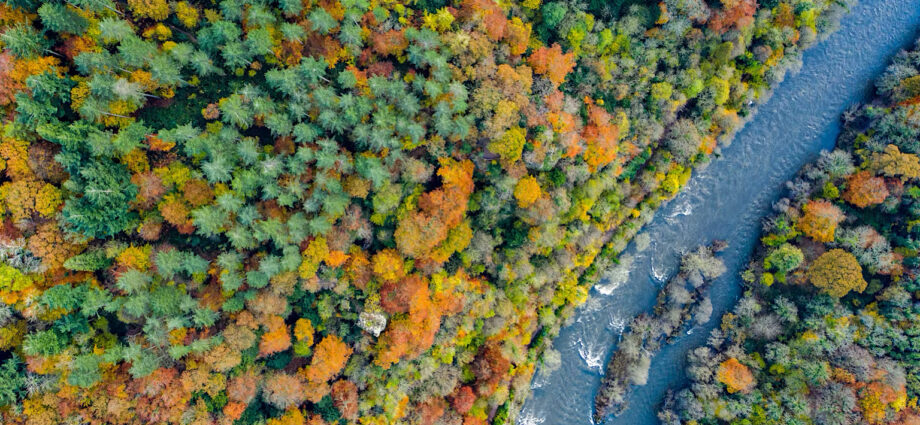
Chris Hilson, University of Reading
October 23, 2025
The River Wye used to be full of wild salmon. Today it is full of algae.
And the meandering waterway which has long attracted anglers, hikers and poets is now the subject of a major pollution lawsuit.
The case – against a British water company and two chicken producers, who all deny responsibility – has been launched on behalf of almost 4,000 people who say their lives are being negatively affected by river pollution. And while legal action brought against river polluters is not new, there has never been a UK case with this many claimants.
A large range of people suing can add legitimacy to a court case, making it harder to ignore than one brought by a small group of activists.
The case is also what’s known as a “strategic” lawsuit. The claimants in the Wye litigation (which also includes the Rivers Usk and Lugg), are suing not just to secure compensation for losses they say they have suffered as a result of the pollution. They’re also trying to draw attention to the plight of some of the UK’s most cherished waterways, and attempting to secure policy change to clean them up.
Similar legal tactics have frequently – and successfully – been used by large groups in a bid to tackle climate change, where strategic litigation has been brought against companies, notably big oil firms, to help portray them as the ones responsible for damaging the climate. The Wye pollution case is similarly aimed in large part at big food companies rather than holding individual farmers responsible.
At the centre of the Wye case is “nutrient overload” of the chemicals nitrogen and phosphorus into river water from agriculture and sewage. This causes excessive growth of algae, robbing the water of oxygen and killing off fish, plants and invertebrates.
Much of the nitrogen and phosphorus is said to come from the excrement of chickens farmed close to the River Wye, and the fertiliser made from it, which is used in other types of farming.
From a global climate change perspective, chicken, as a meat product, is a greener alternative to beef and lamb because of its much lower carbon footprint (chickens produce less methane than cows and sheep).
But campaigners argue that this ignores the local environmental picture, where the concentration of the chicken industry and its nutrients in one area is a major problem. It has been claimed that around a quarter of the UK’s chickens are produced close to the Wye.
River responsibility
An important element of the River Wye court case will come down to what emissions a particular company are deemed responsible for. And again, the lawyers may look to climate change litigation for inspiration.
That’s because companies, internationally, are increasingly obliged or encouraged to report on what are known as scope 3 greenhouse gas emissions – those which result not directly from a company’s operations, but from what happens further down the line (when an oil company’s fuels are used in cars for example).
By contrast, in response to River Wye litigation, one of the defendants, chicken producer Avara Foods, has stated that its direct operations are not the ones causing the nutrient pollution.
Indeed, they argue that their farms meet some of the highest standards in the world. The problem, they say, lies elsewhere, with arable farmers nearby using poultry manure as a fertiliser for their crops.

So here we have a livestock producer apparently blaming another agricultural sector (arable), arguing that individual farmers are “responsible for how nutrients were used in their […] operations”.
Avara Foods is hence trying to limit its responsibility to only direct nutrient emissions from its operations. However, if you produce many tonnes of chicken manure and then sell it on to be used as fertiliser, some would argue – as others have argued against big oil – that you have a responsibility to reduce the effects that come later on.
On this point Avara has argued that it is “not involved in any arable operations and has no control over this activity”.
Avara has further noted that, since January 2024, it has exported all the manure from its supply chain that would previously have been locally sold as fertiliser.
But one of the claimants Justine Evans has suggested that this happened in the face of the pressure from the legal case starting, and still leaves a long period prior to that for which Avara could potentially be liable.
A spokesperson for the company told the BBC it shared concerns over the condition of the River Wye, adding: “We believe that this legal claim is based on a misunderstanding, as no manure is stored or spread on poultry-only farms that supply Avara Foods.”

They continued: “The focus instead needs to be on solutions that will improve the health of the river, addressing all forms of pollution and the effects of climate change, and for action to be taken accordingly.” Freemans of Newent Ltd, the other poultry firm being sued, is a subsidiary of Avara Foods.
Welsh Water said the company had been responsible for “significant investments over recent years”, and reached “real improvements in water quality”.
Whatever happens in the case, the urgency of dealing with these three and other polluted rivers will increase in parallel to the urgency in dealing with climate change. As the UK faces warmer weather and periods of drought, rivers will increasingly suffer from low flow levels. This in turn will exacerbate water pollution from nutrients like nitrogen and phosphorus because there is less water to dilute them.
Chris Hilson, Professor of Law, Director of the Centre for Climate and Justice, University of Reading
Subscribe to our newsletter.
This article is republished from The Conversation under a Creative Commons license. Read the original article.


